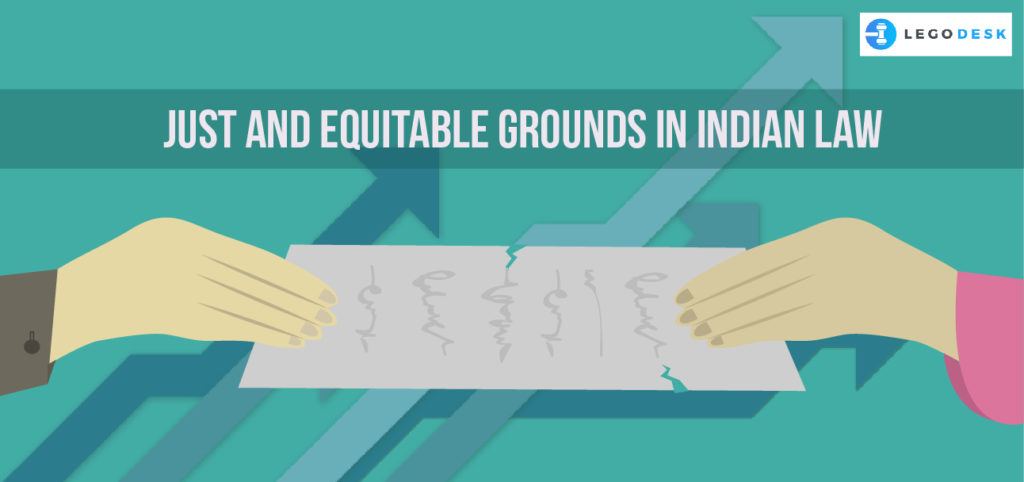Just and Equitable Grounds in Indian Law

As we know that a company is an artificial person instead of a natural person, therefore, it can’t die a natural death. Therefore it can only be terminated by a legal process for which there are two methods i.e. Voluntary and Compulsory winding up.
When the Creditors and the company takes the decision of winding up by settling all the matters by mutual consent without interruption of court, it is called voluntary winding up. But, when the court takes the charge of the matter is called compulsory winding up.
According to Section 433 of the Companies act, there are many ways of winding up of a company by the court from which 433(f) is an eye-catching provision which provides the power of winding up of a company, in the hands of the Court. Tribunal has all the discretionary power to wind up any company on Just and Equitable grounds. Now, these Just and Equitable grounds are not defined in the statute, therefore, it depends on the court to Identify the Justice for all from the matter and pass an order of winding up if it is Justifiable to all.
Usage of Just and Equitable grounds
Any winding up happening with the just and equitable ground is different from a windup happening with a standard creditor’s petition. A just and equitable petition is issued in the case of a shareholder dispute. Hence, the creditor of the company is not required in it. If there is a breakdown in the shareholder’s mutual trust and confidence which is having a calamitous impact on the company, any shareholder can file a petition to wind up the company on just and equitable grounds.
Who can Present a “just and equitable” petition?
Company shareholders or the directors (if board resolution passed by the majority of creditors and shareholders of the company) can file this petition. Any shareholder can also file such petition if they have been a shareholder of the company for minimum 6 out of 18 months preceding the presentation of the petition or if they are the only, or an original shareholder.
The need for such a petition
If any dispute raised in the company which cannot be resolved then winding up petition can be presented to close the company. However, the decision to wind-up lies with the court so, it should not be presumed that the company will be wound up immediately.
Consideration of Tribunal while making its decision
The tribunal will take some different factors into account when deciding whether to make winding up order. This includes the following:-
- Running Procedure of Company
- Whether there is any other solution to the dispute.
- Whether it is ‘Just and Equitable’ to wind-up the company.
- Any other factor which Hon’ble court deems fit.
Read Also: All About Preventive Detention
Just and Equitable grounds provided in the Companies Act
The court may order for the winding up of a company if it thinks that there are just and equitable grounds for doing so. The court has very large discretionary power in this case.
The term ‘just and equitable’ grounds may include any of the grounds for winding up of the company. This power has been given to the court to safeguard the interests of the minority and the weaker group of members.
The court, before passing such an order, will take into account the interest of all the stakeholders in the Company including the shareholders, creditors, employees and also the general public. The court may also refuse to grant an order for the compulsory winding up of the company if it is of the opinion that some other remedy is available to the petitioner to redress his grievances and that the demand for the winding up of the company is unreasonable. A few examples of ‘just and equitable’ grounds on the basis of which the court may order for the winding up of the company are given as follows:
- When the object of the company was fraudulent,
- When substratum of the company has disappeared i.e original object becomes impossible to attain;
- The object for which the company is formed is illegal or becomes illegal by the change in the law;
- The object for which the company was incorporated has been completed;
- Deadlock in management due to differences among rival group and disagreement cannot be resolved in general or board meeting;
- There has been mismanagement and misapplication of funds by directors of the private company.
After taking into consideration the above said points if the court observes that the winding up of the company should be in favour of Justice and Compulsory, then the winding-up order will be made by the court.
Read Also: Concept of Lifting of Corporate Veil
In my opinion, it is properly valid to pass an order to wind up any company on Just and Equitable grounds because there are many people working in any company, therefore, justice should be provided to them by way of such petition if the company is not working properly or any dispute arises in it.
Ref:-Companies Act, 2013
Companies Act, 1956
Try our Debt Resolution solutions today Request a Demo